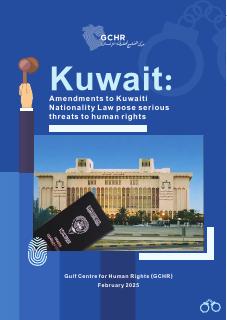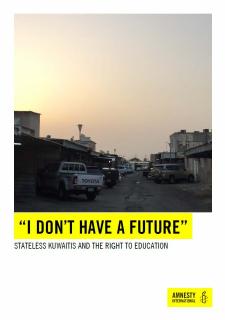“The Bidoon person has become like someone who respects the queue in an environment that does not respect the queue. He never gets his turn!”
Quote from “when time is always not right” by Fahad Al-Mutairi,
Kuwaiti advocate of the Bidoon community.
KEY ISSUES
- Kuwait’s stateless people, known as the “Bidoon”, have been excluded from nationality since the mid-20thcentury, despite their possession of official documents proving them as people of Kuwait’s desert.
- The exact number of the stateless people of Kuwait is disputed and the Government denies the existence of statelessness, treating those who were born and live in the country without any nationality as “illegal residents”.
- The Bidoon are deprived of basic human rights and offered only certain “privileges” on the condition of them accepting an arbitrarily assigned foreign nationality on their documents.
- The suffocating treatment of the Bidoon has increased illiteracy, poverty, forced migration and suicide, and activists from the community face censorship and severe reprisals.
- Kuwait is one of 24 countries with nationality laws that discriminate on the basis of gender, denying women the equal right to confer nationality to their children. The law in theory provides for naturalization of children of Kuwaiti women, but this is subject to ministerial discretion and on the condition that the father is unknown or of divorce or death of the husband.
- There are no safeguards in law for children born in the country who would otherwise be stateless to acquire Kuwaiti citizenship.
- Kuwait is not a state party to either the 1954 or 1961 Statelessness Conventions and has no statelessness determination or protection framework in place. Kuwait has repeatedly ignored recommendations made by committees that oversee legally binding international human rights treaties, calling for specific measures to address statelessness.
STATELESSNESS IN KUWAIT
The stateless people of Kuwait are known as the “Bidoon” (also spelled Bidun or Bedun, meaning ‘without’, as in without citizenship). They are historically the Northern Bedouins of Kuwait. Despite their possession of official documents proving them to be people of Kuwait’s desert (بادية الكويت), the Bidoon have faced exclusion for more than six decades. In 1960, British diplomat to the Middle East Richard Beaumont warned that the 1959 Kuwaiti Nationality Law was so restrictive that it would bring about a generation of people deprived “in what is and has always been their home”. The root of the problem as described by British diplomatic correspondence is nationalist-economic: soon after oil was discovered in Kuwait under the British mandate, a constellation of urban families mobilised a narrative of “Kuwait for the Kuwaitis”. Access to Kuwaiti nationality was restricted to those who lived in the walled Kuwait City, and the further someone resided outside “Kuwait’s Wall”, the more likely they were to be excluded.
From the 1960s to the beginning of the 1980s, the Bidoon were excluded from the right to nationality, but treated as members of Kuwaiti society who were without nationality documents. In the second half of the 1980s, their official status was changed to “illegal residents”. There was no public debate or consultation with those affected; the measure was simply announced in the press and then enforced, and there was no opportunity to challenge the decision taken to deprive the Bidoon of legal status in Kuwait. Today, the Government of Kuwait claims that there are no stateless people in the country, asserting instead that the Bidoon “have entered Kuwait illegally and concealed documents indicating their original nationality for the purpose of settling in Kuwait in order to benefit from services and acquire citizenship”. This is despite Kuwait’s population register in the custody of the UN Security Council as per Resolution 677 (1990), which considered the Bidoon as Kuwaitis until 1 August 1990. Kuwait is not party to the 1954 Convention Relating to the Status of Stateless Persons or the 1961 Convention on the Reduction of Statelessness and has no statelessness determination or protection system in place.
The exact number of stateless people of Kuwait is disputed. According to Amnesty International, population data reported in the government’s Annual Statistical Abstract suggested that the number of Bidoon people in Kuwait had reached 250,000 by 1989 – at which point the legal status and also the method of statistical reporting was altered for the Bidoon (with official population data subsequently “reduced” retroactively). More recently, an estimate of just below 100,000 is commonly given for Kuwait’s Bidoon population, although the large disparity with earlier data is not explained. At the end of 2023, UNHCR reported there to be 92,000 stateless people in Kuwait in its global statelessness statistics. Other sources suggest that the number of the Bidoon people in Kuwait is likely to exceed 150,000, according to a 2020 report by Salam DHR.
Classed “illegal residents”, the stateless people of Kuwait are deprived of the human rights guaranteed to Kuwaiti nationals including the right to housing, public education, healthcare, work and free movement, along with the registration of marriages, births and deaths. Freedom of assembly is forbidden, but tolerated to a limited degree. The exercise of the right to freedom of expression tends to be more restricted than it is for Kuwaiti nationals. The suffocating treatment of the Bidoon has increased illiteracy, poverty, forced migration and suicide, with activists from the community also facing censorship and severe reprisals. In May 2022, a civil society group in Kuwait held a conference on the Global Movement on the Issue of Statelessness, discussing the need for more awareness and organised work to address the struggles the stateless Bidoon people are facing. However, no progress on the matters raised in the conference has been made so far. Only the ‘Platform for the Defense of the Bedoun of Kuwait’ remains dedicated to advocating for the stateless people in Kuwait: they continue to promote stateless people as the primary authors in the Arabic-language Platform Post, the first and only licensed journal in Kuwait’s history to be authored by stateless people.
THE RIGHT TO NATIONALITY IN KUWAIT
In Kuwait, nationality is treated “as a closely-guarded privilege rather than an essential right”. The stipulations of Kuwait’s 1959 Nationality Law make access to nationality very difficult. Nationality based on Article 1 is for “original” Kuwaitis, referring to those “who were settled in Kuwait prior to 1920 and who maintained their normal residence there” until the passing of the law in 1959. In practice, it has proven impossible for Bidoon to establish their entitlement to nationality under this provision, even if they do meet the criteria.
The Nationality Law of Kuwaiti follows the principle of jus sanguinis (law of the blood), with nationality conferred by descent. The law allows a Kuwaiti man to pass nationality on to his children, whether born inside or outside Kuwait, regardless of the mother’s nationality (Article 2). In contrast, Kuwaiti women cannot pass nationality to their children – despite the Kuwaiti Constitution recognising in Article 29 that “all people are equal in human dignity and in public rights and duties before the law”. The law in theory provides for the possibility of naturalization of children of Kuwaiti women, but this is at the discretion of the Minister of Interior and is only possible on the condition that the father is unknown (Article 3) or following divorce or the death of the husband (Article 5). In addition, while a Kuwaiti women cannot pass nationality to a foreign spouse, a Kuwaiti man may confer Kuwaiti nationality on his non-Kuwaiti wife, “provided that she declares her wish to acquire Kuwaiti nationality and that the marriage shall have lasted for at least 15 years from the date of her declaration” (Article 8). The 15-year period imposed for non-Kuwaiti women’s access to Kuwaiti nationality is more regressive than under previous legislation that stipulated a period of five years. In August 2023, it was reported that the government was considering putting forward a bill in the next Parliamentary session removing the possibility of naturalisation of children of Kuwaiti mothers and unknown fathers, and providing for women to lose their Kuwaiti nationality upon divorce from their Kuwaiti husbands.
Kuwait’s nationality law further provides for acquisition of nationality by children of unknown parents, including foundlings (Article 3). However, there are no safeguards in law for children born in the country who would otherwise be stateless to acquire Kuwaiti nationality and the Bidoon experience intergenerational statelessness. The requirements for naturalisation can be found in Article 4 and demand a long residence period that differs between people “belonging to an Arab country” and those who do not: 15 years’ legal residence for the former, 20 years for the latter. The further naturalisation conditions include that the person is “an original Muslim by birth [or] has converted to Islam”, language competency, good character requirements and that the person “possesses qualifications or renders services needed in Kuwait”. There is no facilitated naturalisation for stateless people.
The Nationality Law also provides for the possibility of deprivation of nationality on a number of grounds, including disloyalty and security-related grounds and, for naturalised Kuwaitis, on the basis of fraud or criminal conviction. Kuwait’s higher court has declared that it “has no ‘jurisdiction’ over citizenship issues”, whether by virtue of entitlement or naturalisation, which means that there is no possibility to appeal or seek a remedy for the denial or deprivation of nationality.
THE TREATMENT OF THE BIDOON AS A “SECURITY” ISSUE
In 2010, the government established the Central System to Remedy the Situation of Illegal Residents (known as the Central System), under Amiri Decree 467/2010, to solve the problem within 5 years. The Central System has nothing to do with actual “illegal residents” – people who violate Kuwait’s immigration laws – but instead, according to Hawiati Network, it has been “serving to marginalise and reduce the existence of the stateless community”. Some members of the Central System are involved in anti-Bidoon movements, most prominently “Group 80” that was founded in March 2019 to lobby and oppose any nationality laws which give rights to the Bidoon. Indeed, the Head of the Central System Saleh Al-Fadhalah is a founding member of Group 80.
In response to the Bidoon’s demonstrations in 2011, which were believed to be inspired by the Arab Spring, the Central System announced “11 privileges” for the Bidoon, including the issuance and renewal of driving licences, death and birth certificates, healthcare fee-waivers and subsidised rations. However, in practice, these conditional “privileges” are accessible only with a “Review Card” (also known as “Security Card”), that the Central System issues to Bidoon as a control measure. As documented by Amnesty International, other NGOs, human rights advocates and, in 2023, the UN Human Rights Committee, the Review Card can only be obtained if the individual is willing to accept the arbitrary assignment of a foreign nationality. In the process, the Central System directs the person who needs to receive or renew their card to sign a statement acknowledging undisclosed information. Upon receiving the card, the person would find themselves marked with a foreign nationality without due process. As such, the process is deployed in a manner to coerce the Bidoon to relinquish their claims to Kuwaiti citizenship, otherwise they would be denied access to all basic rights and services, including emergency healthcare.
In June 2023, a committee on “unspecified nationality people” that was formed by the Kuwaiti National Assembly submitted a proposal for a new Civil and Social Rights Bill. It would provide for “renewable” access to a package of rights, including permanent residence in Kuwait, healthcare, education, birth and death certificates, driver’s licenses and passports, subsidised food rations, recourse to courts, permission to work in the private and public sectors (secondary to citizens and children of Kuwaiti women) and the right to own one property for the purpose of use as a home. The committee stressed that this issue should be dealt with from a human perspective and consistent with the tenets of the religion and Sharia of Islam; and the Bill stipulated that the authority to implement the proposal be the Public Authority for Civil Information, instead of being handled by a “security agency” (as has been the case for decades). However, the Bidoon Bill has since been dropped from the government’s programme. The death of Kuwait’s former Emir on 16 December 2023, and the ascendance to throne of the founder of Kuwait’s State Security Apparatus Sheikh Mishal Al-Ahmad Al-Jaber Al-Sabah raises further uncertainty about the treatment of the stateless Bidoon of Kuwait.
KUWAIT’S INTERNATIONAL COMMITMENTS
Kuwait is not a signatory to either the 1954 or 1961 Statelessness Conventions. Kuwait is a state party to both the CRC and CEDAW, but has made a restrictive declaration in respect of Article 7 CRC and a reservation against Article 9, paragraph 2 CEDAW. It is also a state party to the CRPD, ICCPR and ICERD, for which it maintains no reservations against the provisions relating to the right to a nationality. Ratification of these treaties renders them binding in domestic Kuwaiti law according to Article 70 of the Constitution of Kuwait. For more information on regional standards and intergovernmental commitments in MENA, see the StatelessHub MENA page.
- Click here to see what Recommendations Kuwait has received through the Universal Periodic Review
- Click here to see what Recommendations Kuwait has issued through the Universal Periodic Review
- Click here to see what voluntary pledges have been made by Kuwait
The content on this page has been reviewed by SALAM for Democracy and Human Rights
[Last updated January 2024]
Cover image by Greg Constantine
Further reading
VOICES & EXPERIENCES
-
Impacts of statelessness in Kuwait
![Kuwait]()
Impacts of statelessness in Kuwait
![Kuwait]()
“Being uprooted from your home, you begin to bear all of the names—like “immigrant” and “minority” and “middle easterner”—that are put on you. You become deconstructed in a way. You manage to know when to hide parts of yourself while constantly carrying all the roots from which you grew.”
Zahra Hassan Marwan (Artist and Author)
Born to a Kuwaiti mother and a stateless father, Zahra Hassan Marwan self-identifies as a member of the Ayam minority of Kuwait, and was herself stateless for a large part of her life. Currently living in the United States where she was eventually granted citizenship, Zahra works as a traditional artist, using watercolour and ink to explore complex themes such as statelessness, belonging, and homesickness, pride in one’s cultural and linguistic identity, and reclaiming roots. Zahra’s children’s book entitled “Where Butterfies Fill the Sky: a Story of Immigration, Family and Finding Home” (Bloomsbury Publishing, NYC) offers a moving and deeply personal story of how people learn to live as stateless.
Voice from: https://www.newmexicomagazine.org/blog/post/albuquerque-artist-zahra-marwan-childrens-book/
-
Gender discrimination in Kuwait’s nationality law
![Kuwait video screenshot]()
-
Gender discrimination in statelessness in Kuwait
![Kuwait 2]()
Gender discrimination in statelessness in Kuwait
![Kuwait 2]()
‘Women are the most marginalised of the Bidoon [...] They barely live above the poverty line – if that at all, for they constitute the large majority of it. They have no educational backgrounds, which is a result of their parents having to ‘mix up’ their kids’ access to education. That is, parents would alternate which child would go to school every year, so as to give them all some access, as was the case between 1986 - 2003 - or might secure the access only to their sons, for daughters are presumed to be able to be married off.’
Khadeija al-Shammari
The Kuwaiti nationality law discriminates against women by denying women the ability to transmit their nationality to their children and spouses on an equal footing with men. Consequently, if a Kuwaiti woman has a child with a stateless Bidoon man, then their children will inherit their father’s statelessness (and not their mother’s Kuwaiti nationality). This has knock-on consequences for accessing essential state services such as healthcare and education. As such, gender discrimination in nationality laws significantly contributes to the prevalence of statelessness in the region, in addition to causing a number of other human rights violations.
Latest Resources: Kuwait
-

Amendments to Kuwaiti Nationality Law pose serious threats to human rights
Type of Resource: Report
Theme: Nationality Deprivation
Region: Middle East and North Africa
View -

Podcast: The Price of Citizenship
Type of Resource: Podcast
Theme: General / Other
Region: Global / Other
View -

Kuwait: “I don’t have a future”: Stateless Kuwaitis And The Right To education
Type of Resource: News/ Media reporting / Blog
Theme: Children
View



